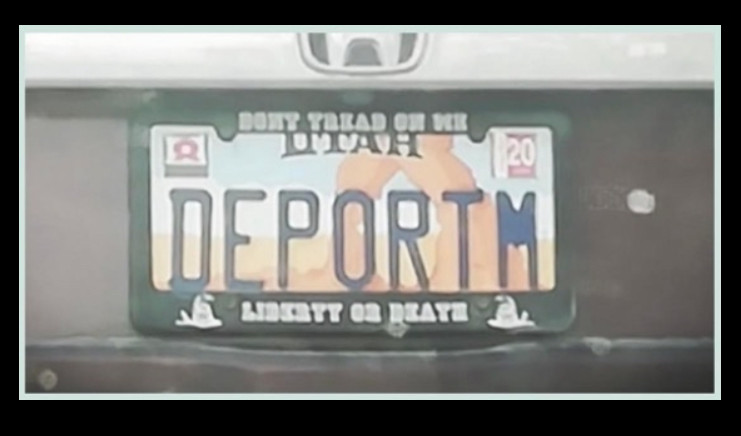Controversial Vanity License Plate Sparks Debate in Utah
A recent incident in Utah has ignited a fierce debate regarding the limits of free speech and the responsibilities of state agencies in monitoring offensive expressions. The controversy centers around a vanity license plate reading “DEPORTM,” which many interpret as an explicit call to “Deport Them.” The uproar began when Matt Pacenza, a teacher, took to Twitter to share a photograph of the plate, questioning how such an inflammatory message could have received approval. This incident has not only drawn attention to the specific plate but also raised broader concerns about xenophobia and public oversight in the state.
Public Outcry and Initial Reactions
The response to the revelation of the “DEPORTM” plate was swift and furious. Hundreds of users on social media expressed their indignation, labeling the message as inherently racist and a blatant failure of the state’s Department of Motor Vehicles (DMV) oversight. Critics argue that a plate bearing such a derogatory message contradicts the values of inclusivity and respect that many Utah residents uphold. Beyond social media, local communities have held discussions and forums, urging state officials to reconsider the implications of allowing such messages on public vehicles. The outcry has not only come from individuals but has also been echoed by various civil rights organizations, which have called for a thorough investigation into the matter. For example, groups like the ACLU of Utah have publicly condemned the plate, stating that it normalizes hate and undermines the state’s commitment to diversity.
DMV’s Oversight and History of the Plate
The Utah DMV confirmed that the controversial vanity plate was approved back in 2015, despite the existence of guidelines that specifically prohibit derogatory language and messages that could incite hate. This revelation has led many to question how such a message could go unnoticed for nearly a decade. The incident highlights potential flaws in the DMV’s review process, which, according to critics, needs significant reform. Reports emerged suggesting that the DMV has a history of inconsistencies in how they evaluate vanity plate applications, with some critics even going as far as accusing the department of neglecting its duty to uphold public decency. This has raised broader questions about accountability and the effectiveness of existing policies designed to prevent hateful expressions from being sanctioned by the state.
Political Responses and Calls for Accountability
The controversy surrounding the “DEPORTM” plate has prompted a rare display of bipartisan condemnation from Utah lawmakers. Notable figures such as Republican Senator Daniel Thatcher and Democratic Senator Luz Escamilla have publicly denounced the plate, expressing shared concern over the implications of allowing such a message to be showcased on a state-issued license plate. Their unified stance signals a critical recognition of the issue at hand, paving the way for discussions on greater accountability within state agencies. Furthermore, both senators have proposed legislative measures aimed at strengthening the review processes for vanity plates, emphasizing the necessity of ensuring that no messages promoting hate or discrimination make it onto state-issued materials.
Investigation and Future Implications
In the wake of the public outcry, the Utah Tax Commission has launched an internal investigation to evaluate the approval process for vanity license plates. Officials have indicated a commitment to strengthening these review processes to prevent similar incidents from occurring in the future. This investigation aims not only to address the specific case of the “DEPORTM” plate but also to implement a more robust framework for assessing all vanity plate applications moving forward. Observers are watching closely to see if this investigation leads to substantial changes, as the outcome may serve as a template for other states grappling with similar issues regarding hate speech and public expression.
The Broader Conversation on Hate Speech and Free Expression
The emergence of the “DEPORTM” plate has triggered a larger conversation about the nature of free speech in public forums, particularly concerning vanity plates, which represent a hybrid of private expression and state endorsement. While the First Amendment protects individuals’ rights to express their viewpoints, states maintain the authority to reject messages deemed offensive or harmful. Advocates for civil rights argue that there must be a clear and actionable policy in place to prevent hate speech from being publicly displayed, particularly on government-sanctioned materials. This incident forces society to wrestle with complex questions regarding when and how free speech can infringe upon the rights of others, creating a challenging balance that needs careful consideration.
Systemic Issues in License Plate Approval Processes
This incident has revealed systemic issues within the approval processes of vanity license plates across the United States. Observers note that similar controversies have arisen in various states, underscoring a need for comprehensive reform. In some cases, there are documented instances of vanity plates approval and subsequent public backlash, highlighting a pattern that begs for scrutiny and revision. Advocates are calling for greater transparency in how vanity plates are reviewed and approved, with an emphasis on including community input in the decision-making process. They argue that the process should not be solely managed by DMV employees in isolation but involve diverse perspectives that can alert officials to the potential societal impacts of certain messages. As civil rights groups continue to pressure state officials for reform, the hope is that this incident will serve as a catalyst for necessary changes in DMV procedures nationwide.
Conclusion: A Call for Change
The uproar surrounding the “DEPORTM” vanity license plate is more than just a reaction to one offensive message; it serves as a critical reflection on societal values and the responsibilities of public institutions. As Utah grapples with the implications of this incident, the conversations it has spurred may lead to significant changes in how state agencies monitor expressions of speech. The collective outrage against this plate exemplifies a societal refusal to condone hate speech and emphasizes the need for stronger safeguards against xenophobic sentiments. Moving forward, the importance of balancing free speech with the responsibility to maintain public decency will remain at the forefront of this ongoing dialogue. It is crucial that state agencies not only react to incidents like this but also proactively develop policies that reflect a commitment to fostering a more inclusive environment for all citizens.

















